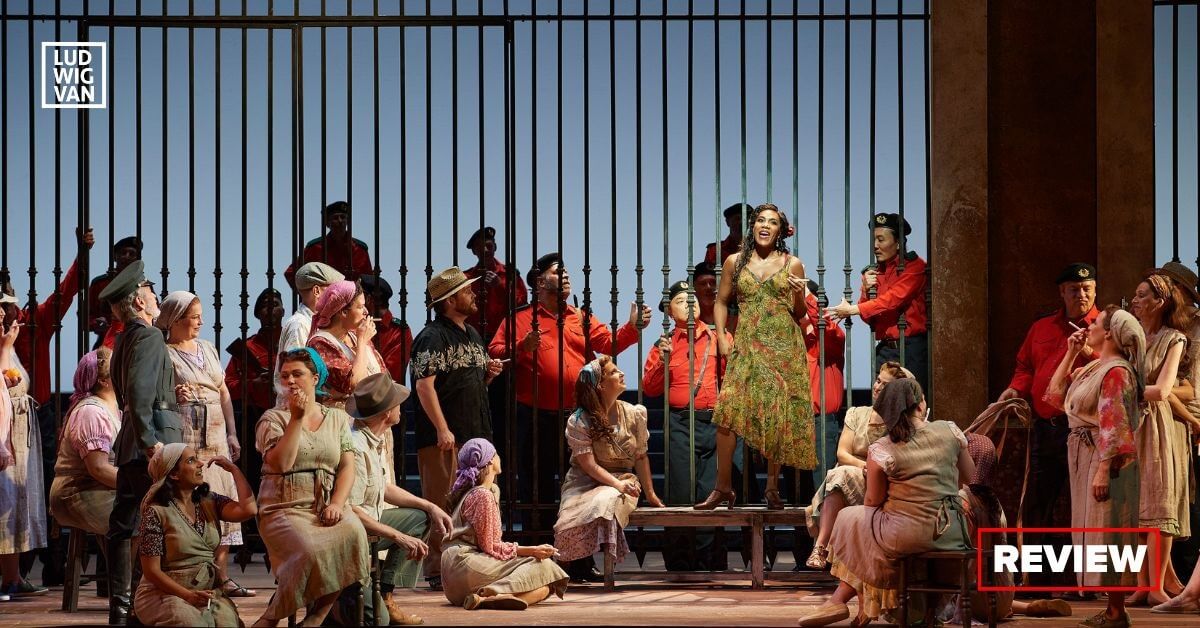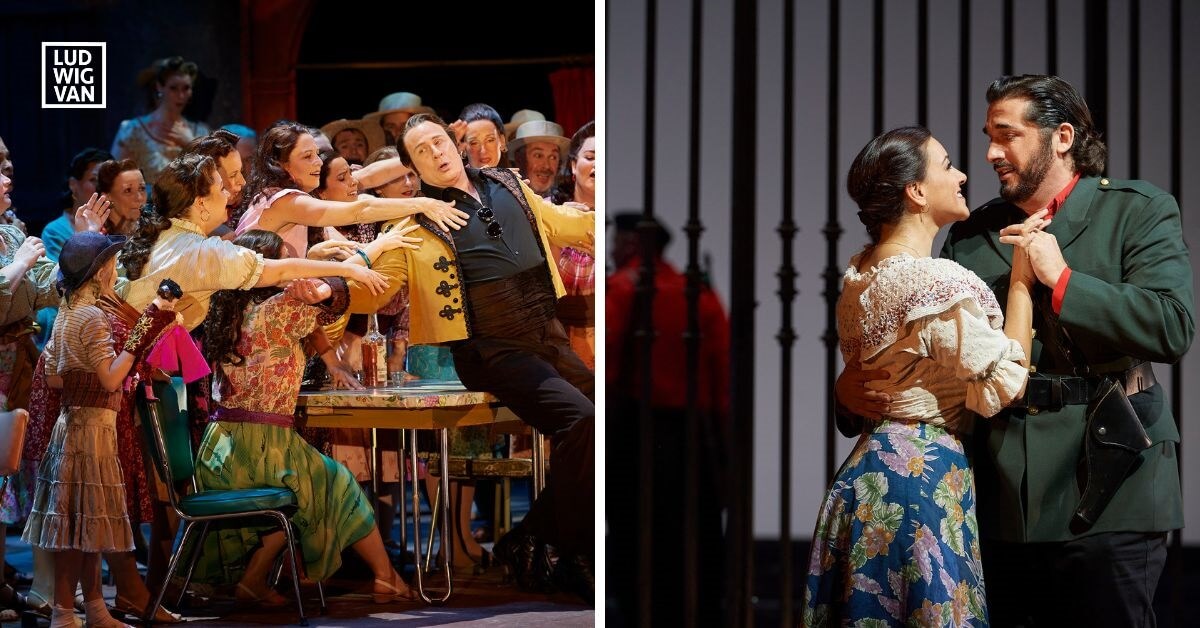
J’Nai Bridges, sop.; Marcelo Puente, ten.; Lucas Meachem, bar.; Joyce El-Khoury, sop.; Alex Halliday, bar.; Alain Coulombe, bass; Ariane Cossette, sop.; Alex Hetherington, mezzo; Jonah Spungin, bar.; Jean-Philippe Lazure, ten. Jacques Lacombe, cond., Orchestra and Chorus of the Canadian Opera Company Four Seasons Centre, October 14, 2022. Continuing Oct. 16, 20, 22, 26, 28, 30, Nov. 4; tickets here.
When it comes to favourite operas in the standard repertoire, few can rival Carmen. According to the website Operabase, Carmen is ranked third in popularity worldwide as measured by the number of performances given by professional opera companies, at 16,313. The Bizet gem is only surpassed by The Magic Flute (18,271) and La Traviata (17,741), but ahead of such operatic warhorses as La Boheme, The Marriage of Figaro, Tosca, and Madama Butterfly.
Carmen is certainly one of the most performed operas in Canada. At this very moment, it’s playing at both the Canadian Opera Company and Pacific Opera Victoria. The current COC production premiered in 2005, with three subsequent revivals — 2010, 2016, and the current run. What accounts for its popularity, you ask? Great music by Bizet of course, with its many beautiful arias, once heard, never forgotten. Also part of its allure is its enduring love story, albeit with a tragic ending. What’s not to love?
To many opera fans, yours truly included, Carmen is the proverbial operatic comfort food — familiar, predictable, and satisfying to the eyes and ears, particularly if all the stars are aligned for a great performance. Given the complexities of an opera performance, true perfection is indeed rare, but a very fine performance like the premiere last evening will take pride of place in the memory bank.
Making her COC debut, American mezzo J’Nai Bridges combined a dark mezzo of ample volume with the requisite stage allure, giving a riveting portrayal of the Gypsy. She was well partnered by Argentinean tenor Marcelo Puente, returning to the COC after an impressive Cavaradossi five seasons ago. His Don Jose was excellent, revealing a clarion tenor with an easy top, plus a most impressive Flower Song. The two of them burned up the stage in the last act.

Baritone Lucas Meacham, last heard in Toronto as Marcello in La Bohème, was a very impressive Escamillo, flooding the Four Seasons Centre with his huge, warm baritone and toreador swagger. Canadian soprano Joyce El-Khoury made a sympathetic Micaëla, her third act aria garnering the loudest applause of the evening. Every single supporting role was very well taken by present and former COC Ensemble Studio artists, a testament of the strength and depth of Canadian talent.
A special shout out to former Ensemble Studio bass Alain Coulombe, the original Zuniga in the 2005 premiere. Returning 17 years later, Coulombe’s Captain is mature, complete with snow-white hair and a walking stick, but still sounding every bit as good. Among the younger generation of Ensemble artists, Ariane Cossette (Frasquita) and Alex Hetherington (Mercedes) were standouts in a wonderfully sung and acted Card Scene.
Now, a word about the production. The 2005 premiere was directed by Mark Lamos with sets by Michael Yeargan. The stage directorship has changed hands twice, to Justin Way (2010) and finally to Joel Ivany, who directed the revival in 2016 and the current one. Then as now, the production, in particular Act One, remains problematic. The iron gate is placed so far downstage that it severely limits staging action. The children’s chorus ends up singing in a line facing the audience, and the staging of the fight scene between Carmen and her rival is unimpressive. In fact, the overall feel of the direction is curiously atypical of the work of Ivany, who’s known for his unorthodox and edgy directorial touches.
Given its physical limitations, there’s little Ivany can do without major structural changes. But in Act Four, Ivany manages to put his personal stamp on the proceedings. He had the principals and some supernumeraries walking down the aisle from the back of the auditorium to go onstage. It’s a theatrical trick he has used many times to great effect in the past, and it worked well once again on an unsuspecting audience.
The audience was politely receptive all evening — that is until the last act when the principals caught fire. Everyone sat up and took notice. Lots of credit to Bridges and Puente for a searing, no-holds-barred final scene. Carmen is decidedly verismo French style, and when it’s done with heart and passion — or blood and guts if you prefer — from the principals, a strong audience response is assured. And, respond they did, with repeated and vociferous ovations at the final curtain, very well deserved.
A large part of the credit of the opening night success goes to Quebec conductor Jacques Lacombe, making his much belated COC debut. He must know the Carmen score like the back of his hand, and it shows — he and the very fine COC Orchestra gave a totally idiomatic performance. Finally, kudos to the terrific COC chorus, juxtaposing Wagner and Bizet with aplomb.
Not to be missed.
#LUDWIGVAN
Get the daily arts news straight to your inbox.



